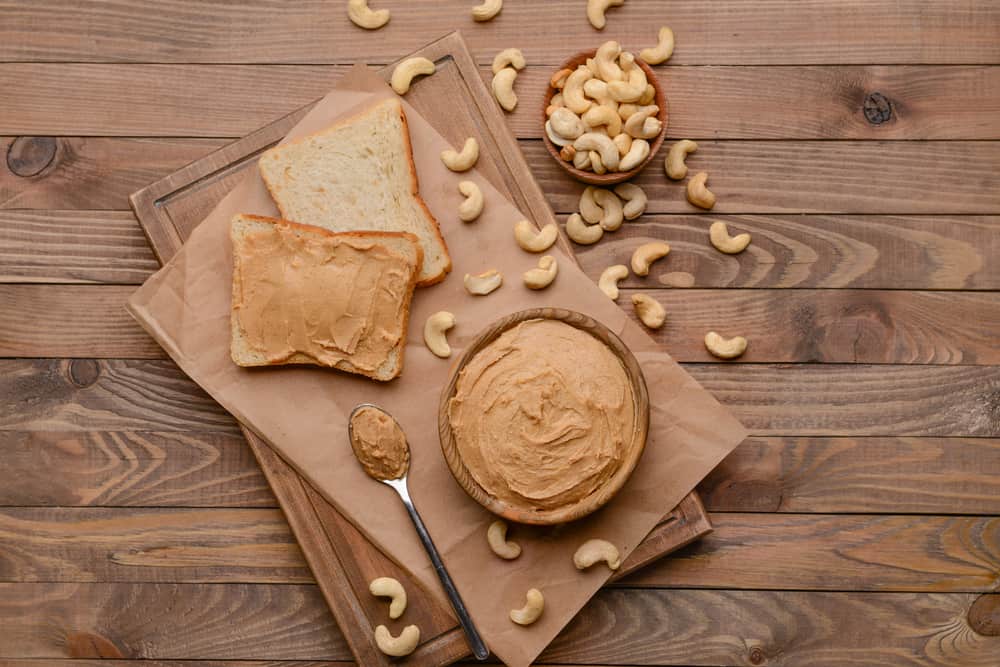ENJOY Free U.S. Shipping on Orders $59+. Shipping not available to Canada, Mexico & non-contiguous U.S. Dismiss

Peanut butter is a classic treat, whether it’s on a sandwich, served with fruit, or an ingredient in your latest batch of cookies. But alternative nut butters are becoming more and more popular recently, with cashew butter often listed as a substitute for peanut butter. Some people worry about the implications for allergies, the nutrition, or the taste difference between these two spreads. While everyone will have a preference, it’s helpful to know the facts about both options as you decide which nut butter is best for your pantry.
Peanut butter is an extremely popular food in the United States, loved for its taste, creamy texture, and nutritional benefits. Many people indulge in peanut butter as an alternative to other sweets, and it’s commonly added to children’s diets as a treat that won’t create bad habits. While you’re probably familiar with the spread, it’s good to have some background you may not know.
Peanut butter is generally considered a healthy snack when eaten in moderation and it contains a number of nutrients that are good for the body. Many people start the day with a piece of toast and peanut butter for a boost in the morning. People who follow a plant-based diet are also big fans of the spread, as its healthy unsaturated fat content is needed for a well-balanced diet as a vegan or vegetarian.
In addition to unsaturated fats, peanut butter also contains protein, potassium, and a variety of minerals. Iron and vitamin B6 are also abundant in the food. It is important to carefully read the ingredients when you buy manufactured peanut butter, as some will contain additives and sweeteners that negate the positive effects on your health!
Peanut butter is very versatile and can be spread on anything from fruits to bread, as well as baked into sweets, or even eaten by the spoonful. There is a distinct taste to peanut butter, so it may not work as a more subtle ingredient, but most people like it for the taste!
When choosing peanut butter, there are a variety of forms, including smooth or crunchy, depending on your exact needs and taste.
Less widely adopted than peanut butter, cashew butter has long been popular amongst those who follow plant-based diets or who suffer peanut allergies. However, cashew butter is an unsung hero of nut butters, as it has nutritional benefits that may surpass peanut butter’s and an even more versatile recipe list.
Like peanut and other nut butters, cashew butter has a high dose of healthy fats, as well as monounsaturated fats in even higher amounts. And while cashew butter has less protein than peanut butter, it contains more carbohydrates, magnesium, iron, vitamin B6, and calcium. The two are similar in caloric content.
When choosing cashew butter, it’s important to be aware if raw cashews or roasted cashews are being used. Butter made from raw cashews will maintain more of the nutritional value, though both have benefits.
Cashew butter can be used in almost any way that peanut butter can, but its slightly richer texture and more subtle flavor make it somewhat more versatile in the kitchen. Soups, sauces, and a number of savory dishes can benefit from the buttery consistency of cashew butter. And because it is typically unsweetened, you don’t have to worry about added sugar content. You can also make desserts with cashew butter.
One reason that many people look for a peanut butter alternative is the rising number of peanut allergies. While some people are allergic specifically to peanuts, there are also many people allergic to nuts as a broader category. You should be cautious before choosing cashew butter as an alternative without knowing more about your allergy.
People are often allergic to the protein in nuts, making them difficult to substitute for one another. If you are allergic to peanuts, you should consult with your doctor before switching to cashew butter.
Both peanut and cashew butter are delicious and versatile spreads packed with nutritional benefits, and one is not inherently better than the other. You should determine what you are looking for in a nut butter, as it may dictate which option you choose. In either case, it is important to make sure the butter you choose is made from the highest quality nuts, helping you avoid additives and maintain nutritional value.
Beyond the Nut’s cashew butter is gluten-free, GMO-free, vegan, and ethically sourced, making our products the best on the market for any of your cashew-related needs.
Fuel Your Beyond with the Latest Discounts, Promotions, and Product Announcements